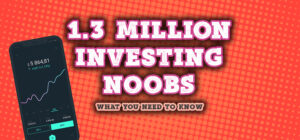Updated: 27th November 2020
How would you invest £1000? We get asked this a lot. Should you invest in stocks and shares, equity funds, gold, property, exchange traded funds, peer to peer lending? And how much should you hold in cash?
In this article we’re looking at some of the best options for investing £1000; including what we would do.
For a more recent discussion on how we’d invest £10,000, check out this video next:
YouTube Video > > >
There are a lot of investment options available to you with £1,000, but if you only have £1,000, you should make sure that your money is accessible, in case of emergency.
Safety First
The only truly liquid asset is cash – we’re saying that you should have an emergency fund of cash saved in a bank to fight financial fires with, and if you only have £1,000 in the world, a cash account would be the place to start.
Unfortunately, one of the main rules of investing is that liquidity is best when return is worst. But some banks offer Regular Saving accounts with decent interest rates, even in this post-crash era.

Stock Market
£1000 is more than enough money to invest in stocks and shares, funds and ETFs.
Many platforms including AJ Bell allow you to invest from as little as £25.This is one of our favourite all-purpose platforms, with amongst the best fees for small pot sizes.
1) Shares
So you can buy shares with £1000, but should you? Unless you just want to practise investing and don’t mind losing your money, avoid buying shares at such low amounts.
We’ve said elsewhere that we think the minimum pot size needed to buy shares is more like £6,000 than £1,000 – unless you’re using a commission-free platform.
The problem with buying only £1000 of shares is that you are unlikely to be diversified enough, unless your platform offers fractional shares.
Due to crippling trading fees on the standard trading platforms, we would spend a minimum of £1000 on each stock to get decent value; so it’s almost like you are gambling rather than investing, as you would only hold one card in your hand. Maybe it does well – maybe it doesn’t.
However; there are now some new “free” platforms get around the problem of fees, making buying small amounts of shares more realistic platforms such as Trading 212 and Freetrade, but are limited in the number of companies and funds on offer. Shares and Funds alike can now be bought fee free! – amazing.
CASHBACK OFFER for our readers: if you want a free share worth up to £200, simply sign up to Freetrade through the link on the Offers page.
2) Exchange Traded Funds (ETFs)
ETFs are amazing because they track stock market indices without needing expensive fund managers, have very limited fees and can have very high diversification.
One great place to buy ETFs is on the Vanguard Platform. Their FTSE 100 and S&P 500 ETFs are ridiculously cheap in terms of fees, and track the market almost perfectly. Some of our all-time favourite investment products.
3) Managed Funds
Managed investment funds are certainly a respectable place to invest your thousand pounds. They are often well diversified across many companies, sectors and geographies.
The problem we have with managed funds are the management fees. Fees on actively managed funds can be quite damaging to long term returns. Sometimes that fee might be worth paying.
And even then, not all funds are expensive. Vanguard also offer funds, including funds of funds!
Vanguard LifeStrategy Funds are collections of other funds and ETFs in one package – a one stop shop for access to a significant chunk of the world markets in one ultra-diversified investment.
The fees are ridiculously low too which we love. If we were starting out in the stock market, we would either start here, or with S&P 500 and FTSE 100 ETFs.
So how can we invest and diversify in the stock market with limited knowledge?
Robo Platforms
Do you want to invest your wealth without having to think too hard, for minimal fees, and with some investment advice thrown in? Then try a robo investing platform.
We would use an established platform like Nutmeg. With even small amounts of money, you get access to basic investment advice, which otherwise would have been unaffordable, and Nutmeg will make the investment decisions for you based on how you answer their questions.
You can even get 6 months without fees if you use the referral link on the Offers page – remember, fees should be avoided at all costs!
Peer to Peer (P2P) Lending
Peer to Peer Lending is a good mix of decent returns, lower risk, and increased liquidity compared to the stock market. Since the coronavirus pandemic strated however, P2P platforms have mostly put themselves on freeze to new investors.
Some are still accepting new customers though, including Loanpad and easyMoney – again, cashback offers are available for these on the Offers page.

What About Commodities? Gold, Oil, etc
Only buying commodities with £1000 wouldn’t give you much diversification.
You could buy some physical gold bullion or invest through an ETF, but gold doesn’t pay a dividend. It is a defensive asset though that could be useful in a downturn, but not essential when you’re first starting out small amounts of money.
What about Property?
For £1000? No chance. You can invest in funds that invest in commercial and residential property, but to buy an actual buy-to-let rental property with the leveraged returns that come with it requires a cash outlay of £30k upwards. Keep this one on the back burner for when your pot is bigger!
Where will you be investing next? Let us know in the comments below.





2 Comments
hi Andy and Ben
i’ve already asked this question in one of your videos. By listening to you guys, i have made up my mind to start investing in the P2P platform and ETFs, even if it’s a small amount. however, my target is to trade stocks full time in the future. even by watching your videos and reading the articles on your website, I still feel confused about investing in ETFs, Do you invest in ETFs just like you buy a share- put stop loss, take profit target, higher time frame? maybe it’s like buy and hold approach…but you would have to put Stop loss, i guess. Or if i sign up with Vanguard, they will invest my money themselves? I hope you understood my confusion.
Buying ETFs is easy investing, you just buy and hold. Best to drip into the market with small monthly installments to best avoid market falls. Vanguard for example give you a monthly investing option, which is also lower fees. But fee-free apps like Freetrade and Trading212 are perhaps better as no fees at all! Ben
Comments are closed for this article!